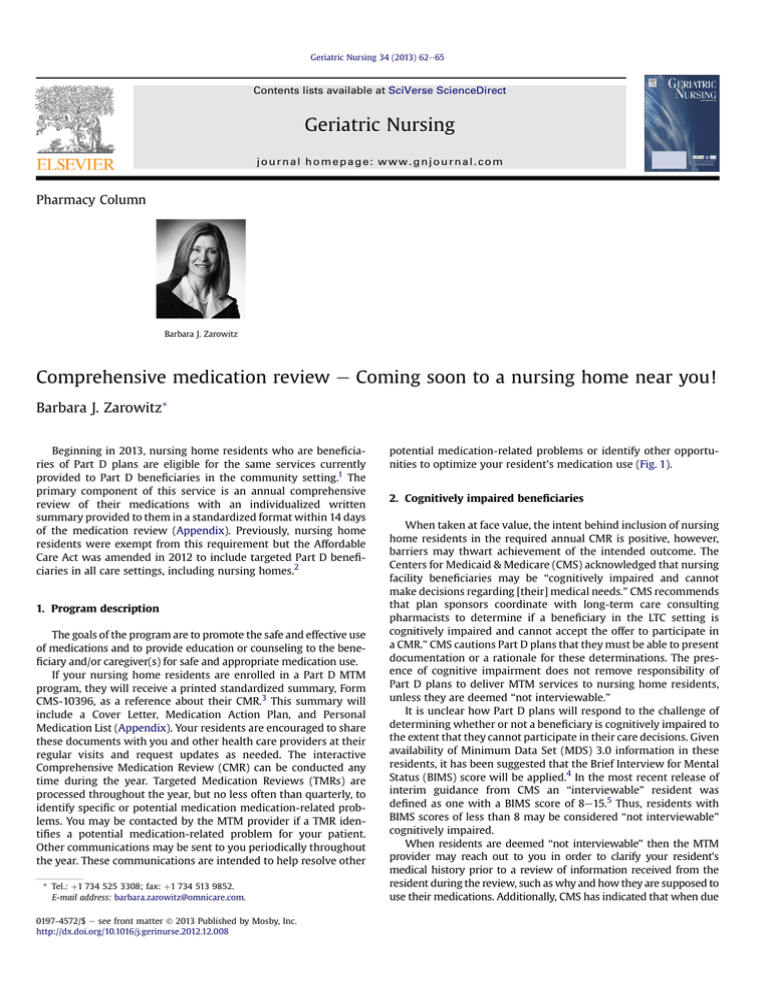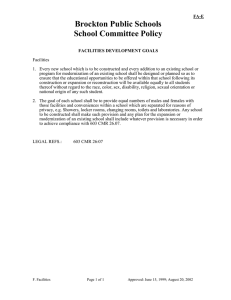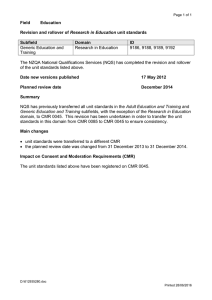- Geriatric Nursing
advertisement

Geriatric Nursing 34 (2013) 62e65 Contents lists available at SciVerse ScienceDirect Geriatric Nursing journal homepage: www.gnjournal.com Pharmacy Column Barbara J. Zarowitz Comprehensive medication review e Coming soon to a nursing home near you! Barbara J. Zarowitz* Beginning in 2013, nursing home residents who are beneficiaries of Part D plans are eligible for the same services currently provided to Part D beneficiaries in the community setting.1 The primary component of this service is an annual comprehensive review of their medications with an individualized written summary provided to them in a standardized format within 14 days of the medication review (Appendix). Previously, nursing home residents were exempt from this requirement but the Affordable Care Act was amended in 2012 to include targeted Part D beneficiaries in all care settings, including nursing homes.2 1. Program description The goals of the program are to promote the safe and effective use of medications and to provide education or counseling to the beneficiary and/or caregiver(s) for safe and appropriate medication use. If your nursing home residents are enrolled in a Part D MTM program, they will receive a printed standardized summary, Form CMS-10396, as a reference about their CMR.3 This summary will include a Cover Letter, Medication Action Plan, and Personal Medication List (Appendix). Your residents are encouraged to share these documents with you and other health care providers at their regular visits and request updates as needed. The interactive Comprehensive Medication Review (CMR) can be conducted any time during the year. Targeted Medication Reviews (TMRs) are processed throughout the year, but no less often than quarterly, to identify specific or potential medication medication-related problems. You may be contacted by the MTM provider if a TMR identifies a potential medication-related problem for your patient. Other communications may be sent to you periodically throughout the year. These communications are intended to help resolve other * Tel.: þ1 734 525 3308; fax: þ1 734 513 9852. E-mail address: barbara.zarowitz@omnicare.com. 0197-4572/$ e see front matter Ó 2013 Published by Mosby, Inc. http://dx.doi.org/10.1016/j.gerinurse.2012.12.008 potential medication-related problems or identify other opportunities to optimize your resident’s medication use (Fig. 1). 2. Cognitively impaired beneficiaries When taken at face value, the intent behind inclusion of nursing home residents in the required annual CMR is positive, however, barriers may thwart achievement of the intended outcome. The Centers for Medicaid & Medicare (CMS) acknowledged that nursing facility beneficiaries may be “cognitively impaired and cannot make decisions regarding [their] medical needs.” CMS recommends that plan sponsors coordinate with long-term care consulting pharmacists to determine if a beneficiary in the LTC setting is cognitively impaired and cannot accept the offer to participate in a CMR.” CMS cautions Part D plans that they must be able to present documentation or a rationale for these determinations. The presence of cognitive impairment does not remove responsibility of Part D plans to deliver MTM services to nursing home residents, unless they are deemed “not interviewable.” It is unclear how Part D plans will respond to the challenge of determining whether or not a beneficiary is cognitively impaired to the extent that they cannot participate in their care decisions. Given availability of Minimum Data Set (MDS) 3.0 information in these residents, it has been suggested that the Brief Interview for Mental Status (BIMS) score will be applied.4 In the most recent release of interim guidance from CMS an “interviewable” resident was defined as one with a BIMS score of 8e15.5 Thus, residents with BIMS scores of less than 8 may be considered “not interviewable” cognitively impaired. When residents are deemed “not interviewable” then the MTM provider may reach out to you in order to clarify your resident’s medical history prior to a review of information received from the resident during the review, such as why and how they are supposed to use their medications. Additionally, CMS has indicated that when due B.J. Zarowitz / Geriatric Nursing 34 (2013) 62e65 63 Fig. 1. Features of comprehensive medication review in long-term care. to cognitive impairment, the LTC resident cannot participate in their own CMR, the MTM provider should reach out to the prescriber, caregiver, or other authorized individual, such as the resident’s health care proxy or legal guardian, to take part in the beneficiary’s CMR. A written summary in CMS’ s Standardized Format must be provided following each CMR, whether the CMR is provided to the beneficiary, or to the authorized individual who may take part in the CMR if the beneficiary cannot participate. Thus, it is quite conceivable that the consultant pharmacist or other MTM provider will be approaching prescribers to participate in the resident’s CMR. 3. Role of the consultant pharmacist CMS has indicated that the LTC consultant pharmacist is a valuable resource for the delivery of CMRs. Part D plans have been encouraged to consider making arrangements that include the LTC consultant pharmacist in conducting Part D MTM services for targeted beneficiaries in LTC. 4. Compare and contrast DRR/MRR with CMR The Consultant Pharmacist will continue to provide Drug Regiment Reviews (DRR or MRR) and if requested by the resident’s Part D plan will also provide the CMR. While there are similarities between DRR and CMR there are several main differences: Both services are federally mandated in nursing home residents B DRR/MRR once every 30 days B CMR once annually DRR/MRR is conducted in every resident whereas CMR will be conducted only in targeted beneficiaries DRR/MRR recommendations are provided to the facility nursing staff or prescriber whereas CMR is provided to the resident (unless cognitively impaired) DRR/MRR recommendations are written in professional language whereas CMR are written in lay language (4th grade reading level) DRR/MRR is a review of all medications over about a 10 min interval but CMR is a face-to-face interview with the resident expected to take about 30e40 min 5. Nursing home/assisted living facility The facility has no explicit requirements for conducting CMR, but will play an important role in helping the consultant pharmacist determine if the resident is “interviewable” or cognitively impaired. If the resident is cognitively impaired, the facility caregiver, prescriber or authorized individual will need to receive the face-to-face (or telephone) interview for the CMR. It will be important that the medical record has documentation regarding the resident’s inability to participate in their own CMR if significant cognitive impairment is present. Lastly, facilities should know that the CMR is required by CMS and Part D plans will be funding these services. Facilities will continue to be financially responsible for DRR/MRR but will not be charged for CMR. 6. Summary There remain numerous unanswered questions pertaining to the roll-out and implementation of the CMR requirement in LTC. Some Part D plans have established relationships with MTM providers and are prepared to launch the expanded MTM program in January while others may be slow to apply the standard in a nursing home population. How Part D plans define “cognitive impairment” and the alternate individual acceptable to participate on behalf of the beneficiary in the CMR may vary widely. Quarterly TMRs may be added on to monthly DRR/MRR 64 B.J. Zarowitz / Geriatric Nursing 34 (2013) 62e65 reviews or may replace monthly reviews at least 4 times during the calendar year. References 1. The Centers of Medicare and Medicaid Services. Announcement of Calendar Year (CY) 2013 Medicare Advantage Capitation Rates and Medicare Advantage and Part D Payment Policies and Final Call Letter [Internet]. Baltimore, MD: The Centers of Medicare and Medicaid Services. Available from: http://www.cms.gov/Medicare/ Health-Plans/HealthPlansGenInfo/Downloads/2013-Call-Letter.pdf; April 2, 2012. Accessed 18.11.12. 2. CY2013 Medication Therapy Management Program Guidance and Submission Instructions [Internet]. Baltimore, MD: The Centers of Medicare & Medicaid Services, Department of Health and Human Services. Available from: http://www.cms.gov/Medicare/Prescription-Drug-coverage/PrescriptionDrugCovGenIn/ Downloads/Memo-Contract-Year-2013-Medication-Therapy-Management-MTMProgram-Submission-v041012.pdf; April 12, 2012. Accessed 18.11.12. 3. A Physician’s Guide to Medicare Part D Medication Therapy Management Programs (MTM) [Internet]. MLN MattersÒ Number SE1229, Centers of Medicare & Medicaid Services, Department of Health and Human Services. Available from: http://www.cms.gov/Medicare/Prescription-Drug-Coverage/PrescriptionDrug CovContra/Downloads/PhysiciansGuidetoMedicarePartDMTM110812.pdf; Accessed on 19.11.12. 4. Maryland Department of Health and Mental Hygiene. Brief Interview for Mental Status [Internet]. Baltimore, MD: Department of Health and Mental Hygiene. Available from: http://dhmh.dfmc.org/longTermCare/documents/BIMS_Form_ Instructions.pdf; October 2011. Accessed on 19.11.12. 5. Director of Survey and Certification. Advanced Interim Guidance e Revisions to State Operations Manual (SOM). Appendix P-Traditional Survey Protocol for Surveyors of Long-Term Care (LTC) Facilities and Chapter 9/Exhibits Including Survey Forms 672, 802, 802S, and 802P [Internet]. Ref S&C: 12-45-NH. Center for Clinical Standards and Quality/Survey and Certification Group, Centers of Medicare & Medicaid Services, Department of Health and Human Services. Available from:, http://www.cms.gov/Medicare/Provider-Enrollment-and-Certification/Survey CertificationGenInfo/Downloads/Survey-and-Cert-Letter-12-45.pdf; September 27, 2012. Accessed 19.11.12. B.J. Zarowitz / Geriatric Nursing 34 (2013) 62e65 Appendix 65

